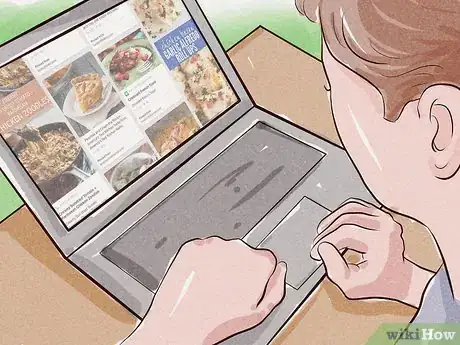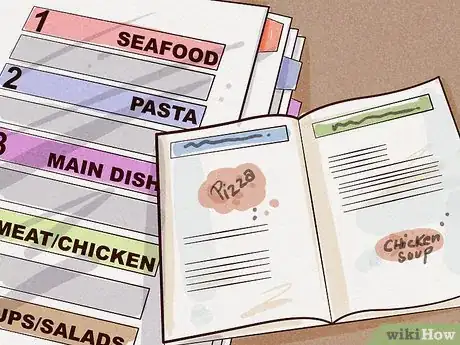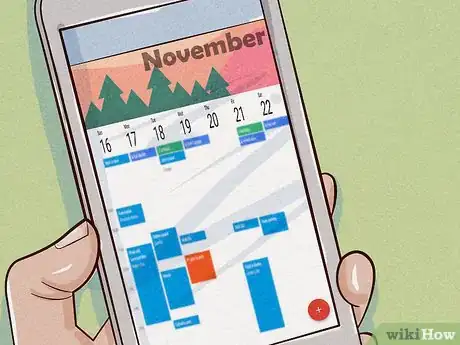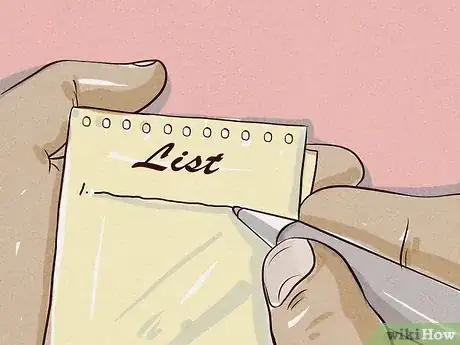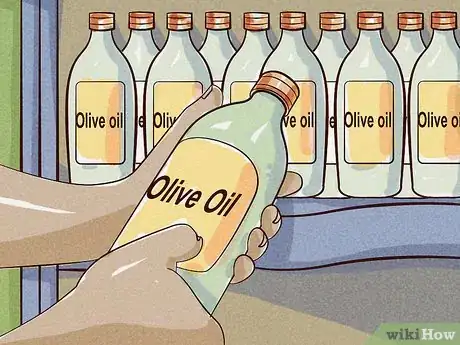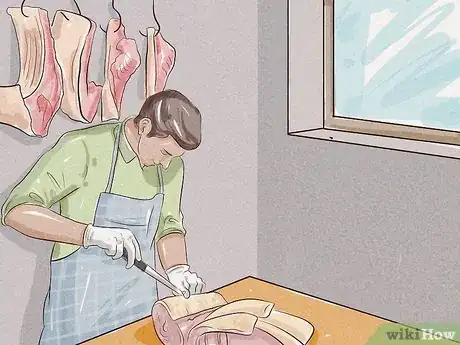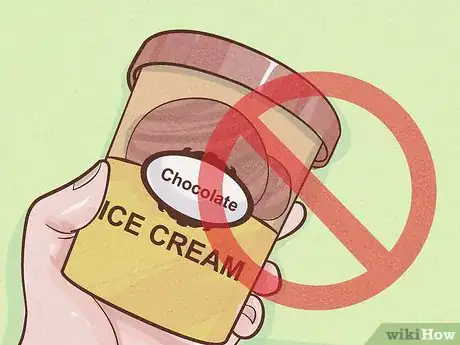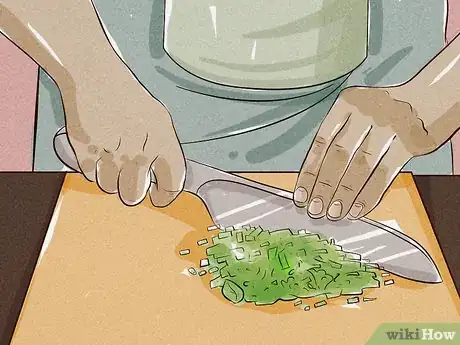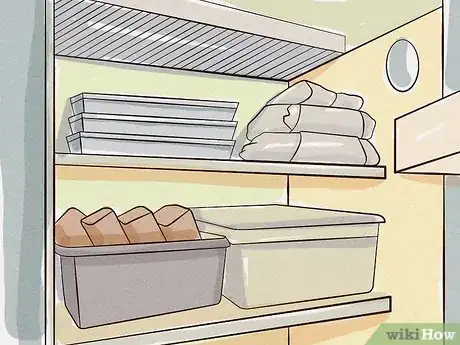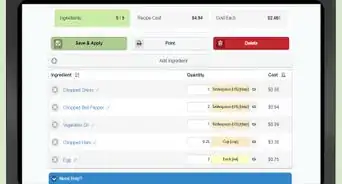This article was co-authored by Adrienne Youdim, MD. Dr. Adrienne Youdim is a Board Certified Internist specializing in medical weight loss and nutrition and founder and creator of Dehl Nutrition - a line of functional nutritional bars and supplements. With 10+ years of experience, Dr. Youdim uses a holistic approach to nutrition that blends lifestyle changes and evidence-based medicine. Dr. Youdim holds a BA from the University of California, Los Angeles (UCLA) and an MD from the University of California, San Diego (UCSD). She completed her residency training and fellowship at Cedars-Sinai. Dr. Youdim holds multiple board certifications awarded by the American Board of Internal Medicine, the National Board of Physician Nutrition Specialists, and the American Board of Obesity Medicine. She is also a Fellow of the American College of Physicians. Dr. Youdim is an Associate Professor of Medicine at UCLA David Geffen School of Medicine and an Assistant Professor of Medicine at Cedars-Sinai Medical Center. She has been featured on CBS News, Fox News, Dr. Oz, National Public Radio, W Magazine, and the Los Angeles Times.
There are 8 references cited in this article, which can be found at the bottom of the page.
This article has been viewed 17,524 times.
Planning out your meals for the week can save you time at the grocery store and get you and your family eating more home-cooked meals each week. Meal planning takes some organization, but it’s not hard once you get into a weekly rhythm. Start by choosing recipes for the upcoming week and making a grocery list based on those dishes. Then, strategize in the grocery store to get the most out of your trip. Finally, do some prep at the beginning of the week to make cooking each night a little easier, and don’t forget about the wonder of leftovers!
Steps
Organizing Your Recipe and Shopping Lists
-
1Ask yourself what your meal planning goals are. Decide why you want to meal plan. Are you trying to eat healthier? Save money? Maybe you’re running out to the grocery store 10 times a week, and that’s starting to feel ridiculous. Knowing your primary motivations and goals can help guide which recipes you choose.[1]
- For example, if you’re trying to incorporate healthier meals, you’ll likely want to look at health food blogs or balanced eating cookbooks for ideas. You might also want to choose certified organic produce, meat, and dairy products.
- If you’re trying to save money, plan to do some coupon-clipping during your meal planning sessions.
- If you need less chaos in your life, consider adding 1-2 crockpot recipes to your weekly docket. These usually produce leftovers, and they can cook all day without you needing to lift a finger to check on them.
-
2Check the weather for the week. If some cold, crisp weather is forecast for your area, consider making a hearty stew. When the temperature’s set to climb, you might prefer a shrimp salad and chilled soup.[2]
- The season can also determine recipes based on which vegetables you’d like to purchase. While everything you need will be available at the grocery store year-round, in-season options may be locally sourced and less expensive than out-of-season produce.[3] You could also find in-season fruits and veggies at a farmers’ market.
Advertisement -
3Make an online list to keep track of online recipes. The Internet is a great resource for recipes. It allows you to search for recipes that fit your needs, whether those are healthy or gluten-free options or fall-themed meal ideas. Keeping track of all these options, however, can be tough. The easiest option is to sign up for a Pinterest account, download the Internet plug-in, and create a board dedicated to recipes.[4]
- Pinterest’s Internet plugin allows you to easily “pin” recipes you like to your board as you’re browsing online.
- You can also create a Google Doc for your recipes. Cut and paste any links to recipes you love right into the doc!
-
4Use a binder and colored tabs for paper recipes and cookbooks. You know you still want to break out your mom’s treasured cookbook for those tried-and-true recipes. You may also prefer printing recipes off the Internet and storing them as hard copies. Mark which recipes you like in your cookbooks with Post-Its, writing a small note on the Post-It to jog your memory. Use binder tabs to organize printed recipes. There are several ways you can separate recipes in your binder, including:[5]
- Dedicating different sections to appetizer, entree, side, and dessert recipes.
- Organizing recipes by their level of difficulty, or whether they’re “easy” or “hard” to prep.
- Filling a few sections with seasonal or holiday recipes.
-
5Check with your family to make sure the recipes work. You can even organize a weekly sit-down where all the members of your household pick out recipes together. Treat this like a fun way to discover new foods and dishes, rather than a chore. Remember, though, to add at least a few days of recipes you’ve cooked before each week. Don’t plan for a full week of new recipes.[6]
- If you prefer to pick out the weekly recipes on your own, that works, too! Just double-check that what you’ve got on the docket sounds good to everyone who’s going to be at the table.
- Look for recipes throughout the week and finalize your choices on Friday.
-
6Plan leftover and takeout nights. Purposefully look for recipes that will make more food than you and your family can eat in 1 sitting. This will allow you to pack some away in the fridge for lunches or another dinner later in the week, cutting down on your prep and cooking work. It’s also a good idea to plan to eat out once every week or every other week.[7]
- Eating out gives you a much-needed break, and it also exposes you to new recipes! However, it will cause your weekly food costs to climb. If you’re hoping to stick to a strict budget, try to only go out for special occasions.
- You might also consider having a few themed nights each week. For example, maybe every Tuesday is taco night, Wednesday is for crockpot meals, and Friday is pizza night. This, too, will simplify your planning.
-
7Use a calendar to keep track of your weekly recipes. This could be as simple as writing out the days of the week along with your chosen recipes on a piece of scrap paper and putting it on the fridge. You can also use a desk calendar or planner if you’d like more permanent records of what you’re eating from week to week.
- If you and your family members are tech-savvy, consider using Google Calendar. You can share this calendar with your family members and add reminders or lists to it if you’d like. Then everyone can access it from their devices whenever they’d like!
-
8Make a list of all the ingredients you need. Once you’ve picked out your recipes, write down all the ingredients you need on a sheet of paper. Cross out the items you’ve already got in your fridge or pantry. Make sure that you’ve got enough of every ingredient you already have in your kitchen to cover all of your needs for the week.[8]
-
9Create your grocery list using your ingredient list. Use a separate sheet of paper (or even an index card) to write down what you need at the store. Pair items by their location or type to make it easier to keep track of what’s in your cart. For example, write down all the produce you need before moving on to the spices.[9]
- Don’t forget to add whatever weekly staples your family needs, as well. You don’t want to run out of toilet paper on Wednesday morning and need to dash back out!
- It’s a good idea to finish making your grocery list the night before your shopping trip. This will get you ready to go shopping the next day.
Going to the Grocery Store
-
1Choose an early morning to do your shopping. Unfortunately, Saturdays and Sundays are the busiest shopping days. For meal planning to work, it’s best to brave the weekend crowds. However, consider going to the grocery store right when it opens. The produce, meat, and fish will be fresher, and it won’t be quite as packed as midday.[10]
- You can also shop right before the store closes. Especially on the weekends, it won’t be quite as crowded. Depending on your store, fresh items should also have been replaced by this time of day.
-
2Ensure that you’ve stocked your pantry with the basics. There a few things that you should always have around if you’re going to be cooking a lot. Keep an eye on these items so you know when you’re running low. If you’re in the store and can’t remember if you’ve run out, go ahead and make the purchase. Some essentials might be:[11]
- Olive oil, as well as white and red wine vinegars.
- Salt and pepper.
- Chicken and/or vegetable stock.
- Rice, pasta, and noodles, as well as beans and lentils.
- Canned tomatoes.
- A natural sweetener like honey, maple syrup, or agave syrup.
- Canned coconut milk.
-
3Check the grocery store circular for sales. As you’re walking into the store, pick up the sales list. Compare your list to the circular to see if there’s any overlap. You might also consider if you can make easy substitutions in your recipes for items that are on sale.[12]
-
4Visit the butcher first if you want your meat prepped. The butcher can cut your meat to make it match what your recipe calls for, saving you crucial time at home. Depending on the item, you can also ask the folks at the fish market to prepare your seafood for you. They’ll usually take about 10-15 minutes to finish up, so you can pick up your packets of meat and fish right before you check out.[13]
-
5Leave the frozen aisles for the end. This is especially important if it’s summer or if you live in an area that’s warm year-round. Don’t let your hard-earned money get wasted because your ice cream melted and your frozen chicken defrosted![14]
Making and Storing Your Meals
-
1Set aside an hour on Sunday for meal prep. Now that you’ve planned out your meals and gone shopping, all you probably want to do is take a break before the real work starts. Before you do that, make yourself prep whatever ingredients you can either right when you get back from the store or the next day. For example, you can:[15]
- Wash and chop vegetables and mince herbs. Be aware that some veggies may get a bit wilted after they’ve been chopped. You can refresh them by soaking them in a bowl of cold water for 5-10 minutes before cooking with them.[16]
- Make marinades and sauces.
- Cook ingredients (like chicken) that will be used in dishes within the next 3 days.
-
2Involve your family in cooking each night if you can. As you move into the cooking phase, enjoy yourself! Having your family cook together is a great way to spend time with one another and debrief about your days. It’ll also make cooking feel less like work and more like a fun nightly ritual.
-
3Make double batches of ingredients and meals for freezing. Any time you can easily double a recipe, do so. Frozen home-cooked meals can come in handy as Plan B’s, or even as a planned meal when you know you’re going to be short on time. Just be sure that your freezer doesn’t become overstuffed, as it’s easy to forget what you’ve got in there![17]
- All food has different freezer expiration dates, which you can easily look up online. However, most items can last somewhere between 6 months to 1 year in the freezer.
- Take frozen meals out of the freezer about 2 days before you plan to eat them. This should give them plenty of time to thaw out.
Expert Q&A
-
QuestionHow do I make meal prep a weekly habit?
 Adrienne Youdim, MDDr. Adrienne Youdim is a Board Certified Internist specializing in medical weight loss and nutrition and founder and creator of Dehl Nutrition - a line of functional nutritional bars and supplements. With 10+ years of experience, Dr. Youdim uses a holistic approach to nutrition that blends lifestyle changes and evidence-based medicine. Dr. Youdim holds a BA from the University of California, Los Angeles (UCLA) and an MD from the University of California, San Diego (UCSD). She completed her residency training and fellowship at Cedars-Sinai. Dr. Youdim holds multiple board certifications awarded by the American Board of Internal Medicine, the National Board of Physician Nutrition Specialists, and the American Board of Obesity Medicine. She is also a Fellow of the American College of Physicians. Dr. Youdim is an Associate Professor of Medicine at UCLA David Geffen School of Medicine and an Assistant Professor of Medicine at Cedars-Sinai Medical Center. She has been featured on CBS News, Fox News, Dr. Oz, National Public Radio, W Magazine, and the Los Angeles Times.
Adrienne Youdim, MDDr. Adrienne Youdim is a Board Certified Internist specializing in medical weight loss and nutrition and founder and creator of Dehl Nutrition - a line of functional nutritional bars and supplements. With 10+ years of experience, Dr. Youdim uses a holistic approach to nutrition that blends lifestyle changes and evidence-based medicine. Dr. Youdim holds a BA from the University of California, Los Angeles (UCLA) and an MD from the University of California, San Diego (UCSD). She completed her residency training and fellowship at Cedars-Sinai. Dr. Youdim holds multiple board certifications awarded by the American Board of Internal Medicine, the National Board of Physician Nutrition Specialists, and the American Board of Obesity Medicine. She is also a Fellow of the American College of Physicians. Dr. Youdim is an Associate Professor of Medicine at UCLA David Geffen School of Medicine and an Assistant Professor of Medicine at Cedars-Sinai Medical Center. She has been featured on CBS News, Fox News, Dr. Oz, National Public Radio, W Magazine, and the Los Angeles Times.
Board Certified Internist Pick a day of the week over the weekend that you put aside a few hours for purchasing and preparing food. That should be a ritual. It's something that you do every week just like you get yourself ready for the workweek. We put time and intention towards our work, and we should also do that for our own well-being.
Pick a day of the week over the weekend that you put aside a few hours for purchasing and preparing food. That should be a ritual. It's something that you do every week just like you get yourself ready for the workweek. We put time and intention towards our work, and we should also do that for our own well-being. -
QuestionWhat are some convenient, easy foods I can buy at the grocery store for making meals?
 Adrienne Youdim, MDDr. Adrienne Youdim is a Board Certified Internist specializing in medical weight loss and nutrition and founder and creator of Dehl Nutrition - a line of functional nutritional bars and supplements. With 10+ years of experience, Dr. Youdim uses a holistic approach to nutrition that blends lifestyle changes and evidence-based medicine. Dr. Youdim holds a BA from the University of California, Los Angeles (UCLA) and an MD from the University of California, San Diego (UCSD). She completed her residency training and fellowship at Cedars-Sinai. Dr. Youdim holds multiple board certifications awarded by the American Board of Internal Medicine, the National Board of Physician Nutrition Specialists, and the American Board of Obesity Medicine. She is also a Fellow of the American College of Physicians. Dr. Youdim is an Associate Professor of Medicine at UCLA David Geffen School of Medicine and an Assistant Professor of Medicine at Cedars-Sinai Medical Center. She has been featured on CBS News, Fox News, Dr. Oz, National Public Radio, W Magazine, and the Los Angeles Times.
Adrienne Youdim, MDDr. Adrienne Youdim is a Board Certified Internist specializing in medical weight loss and nutrition and founder and creator of Dehl Nutrition - a line of functional nutritional bars and supplements. With 10+ years of experience, Dr. Youdim uses a holistic approach to nutrition that blends lifestyle changes and evidence-based medicine. Dr. Youdim holds a BA from the University of California, Los Angeles (UCLA) and an MD from the University of California, San Diego (UCSD). She completed her residency training and fellowship at Cedars-Sinai. Dr. Youdim holds multiple board certifications awarded by the American Board of Internal Medicine, the National Board of Physician Nutrition Specialists, and the American Board of Obesity Medicine. She is also a Fellow of the American College of Physicians. Dr. Youdim is an Associate Professor of Medicine at UCLA David Geffen School of Medicine and an Assistant Professor of Medicine at Cedars-Sinai Medical Center. She has been featured on CBS News, Fox News, Dr. Oz, National Public Radio, W Magazine, and the Los Angeles Times.
Board Certified Internist Making a dozen hard-boiled eggs on a Sunday that you could use to throw into your lunch or for snacks for the week is a great idea. You could buy pre-cooked rotisserie chicken and have that as a go-to meal. Having things like canned tuna, beans, grains, and legumes in your pantry is also really convenient. There are a lot of grains that you could cook and then eat throughout the week, like quinoa and farro. Frozen produce is also super convenient. It keeps its nutrients, and it won't go bad, so you don't have to worry about wasting fresh produce.
Making a dozen hard-boiled eggs on a Sunday that you could use to throw into your lunch or for snacks for the week is a great idea. You could buy pre-cooked rotisserie chicken and have that as a go-to meal. Having things like canned tuna, beans, grains, and legumes in your pantry is also really convenient. There are a lot of grains that you could cook and then eat throughout the week, like quinoa and farro. Frozen produce is also super convenient. It keeps its nutrients, and it won't go bad, so you don't have to worry about wasting fresh produce.
Warnings
- Expect that there may be some foods you will need to get during the week if your family eats or drinks high volumes, such as a gallon of milk or loaf of bread⧼thumbs_response⧽
- Be aware that it’ll take you a little while to get used to meal planning. Give yourself at least a month or 2 to get the hang of it and figure out what works for you and what doesn’t.⧼thumbs_response⧽
References
- ↑ https://www.thekitchn.com/the-beginners-guide-to-meal-planning-what-to-know-how-to-succeed-and-what-to-skip-242413
- ↑ http://www.thekitchn.com/10-tips-for-better-weekly-meal-planning-reader-intelligence-report-177252
- ↑ https://www.mindbodygreen.com/0-4807/10-Reasons-to-Eat-Whats-In-Season.html
- ↑ http://blog.myfitnesspal.com/meal-planning-for-beginners/
- ↑ http://blog.myfitnesspal.com/meal-planning-for-beginners/
- ↑ https://www.thekitchn.com/the-top-10-mistakes-meal-planning-beginners-make-and-how-to-solve-them-242085
- ↑ http://www.thekitchn.com/10-tips-for-better-weekly-meal-planning-reader-intelligence-report-177252
- ↑ https://www.thekitchn.com/the-beginners-guide-to-meal-planning-what-to-know-how-to-succeed-and-what-to-skip-242413
- ↑ https://www.thekitchn.com/the-beginners-guide-to-meal-planning-what-to-know-how-to-succeed-and-what-to-skip-242413
- ↑ https://www.today.com/food/best-time-go-grocery-store-worst-t108655
- ↑ https://www.thekitchn.com/the-meal-planning-pantry-10-things-to-have-in-your-pantry-for-better-meal-planning-241549
- ↑ http://blog.myfitnesspal.com/meal-planning-for-beginners/
- ↑ https://www.thekitchn.com/the-beginners-guide-to-meal-planning-what-to-know-how-to-succeed-and-what-to-skip-242413
- ↑ https://www.thekitchn.com/the-beginners-guide-to-meal-planning-what-to-know-how-to-succeed-and-what-to-skip-242413
- ↑ https://www.thekitchn.com/the-beginners-guide-to-meal-planning-what-to-know-how-to-succeed-and-what-to-skip-242413
- ↑ https://www.washingtonpost.com/lifestyle/food/one-way-to-fight-food-waste-revive-wilted-produce/2013/09/16/b1342b20-1b1a-11e3-a628-7e6dde8f889d_story.html?utm_term=.7697cdb7d944
- ↑ http://www.thekitchn.com/10-tips-for-better-weekly-meal-planning-reader-intelligence-report-177252
- ↑ https://www.thekitchn.com/the-top-10-mistakes-meal-planning-beginners-make-and-how-to-solve-them-242085
About This Article
To plan weekly meals, start by listing the week’s recipes on a desk calendar or calendar app. Next, prepare your shopping list by listing the ingredients you need, and crossing out the items you already have in the fridge or pantry. If possible, shop early in the morning to avoid large crowds, and set aside 1 hour afterwards to prep your ingredients. For example, wash and chop the vegetables, and mince the herbs. Then, pre-cook meats like chicken if you’ll be using them in the next 3 days. For more advice from out Dietary reviewer, including how to find and keep track of recipes online, keep reading!


